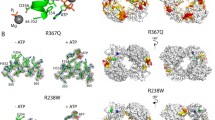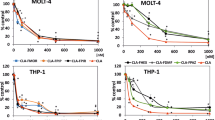Abstract
Human monoblastoid cells (U937) grown in the presence of therapeutically relevant dideoxycytidine concentrations (0.1 μM) become resistant to the drug thanks to an altered deoxycytidine kinase. In this paper we show that deoxycytidine kinase mRNA is significally reduced in drug-resistant U937 cells (U937-R) although the deoxycytidine kinase promoter is normal. A number of nucleotide deletions, insertions and substitutions was found in the coding region of deoxycytidine kinase gene. Several identified mutations result in truncated forms of the enzyme or in the introduction of stop codons: in one case a complete lack of exon 4 was found. Thus, the deoxycytidine kinase gene accumulates mutations at a very high rate, as already reported for other cytidine analogues (i.e. Ara C ) suggesting that the design of new antiviral or anticancer drugs of the cytidine family should take into account the potential development of cell resistance as a critical factor in drug failure.
Similar content being viewed by others
References
Adkins JC, Peters DH, Faulds D: Zalcitabine. An update of its pharmacodynamic and pharmacokinetic properties and clinical efficacy in the management of HIV infection (Review). Drugs 53: 1054–1080, 1997
Chen CH, Cheng YC: The role of cytoplasmic deoxycytidine kinase in the mitochondrial effects of the anti-human immunodeficiency virus compound, 2′,3′-dideoxycytidine. J Biol Chem 267: 2856–2859, 1992
Hengstschlanger M, Denk C, Wawra E: Cell cycle regulation of deoxycytidine kinase: Evidence for post-transcriptional control. FEBS Lett 321: 237–240, 1993
Chen EH, Johnson EE, Vetter SM, Mitchell BS: Characterization of the deoxycytidine kinase promoter in human lymphoblast cell lines. J Clin Invest 95: 1660–1668, 1995
Magnani M, Brandi G, Casabianca A, Fraternale A, Schiavano GF, Rossi L, Chiarantini L: 2′,3′-Dideoxycytidine metabolism in a new drug-resistant cell line. Biochem J 312: 115–123, 1995
Magnani M, Gazzanelli G, Brandi G, Casabianca A, Fraternale A, Chiarantini L, Rossi L: 2′,3′-Dideoxycytidine induced drug resistance in human cells. Life Sci 57: 881–887, 1995
Veronique WT, Ruitz VH, Godefridus JP: New targets for pyrimidine antimetabolites for the treatment of solid tumors. Pharm World Sci 16: 104–112, 1994
Brandi G, Puddu P, Casabianca A, Cianfriglia M, Magnani M: The inhibitory effect of ddC on human immunodeficiency virus replication diminishes in cells that are chronically exposed to the drug. Antiviral Chem Chemother 8: 113–119, 1997
Veuger MJT, Honders MW, Landegent JE, Willemze R, Barge RMY: High incidence of alternatively spliced forms of deoxycytidine kinase in patients with resistant acute myeloid leukemia. Blood 96: 1517–1524, 2000
Rights and permissions
About this article
Cite this article
Innoceta, A., Galluzzi, L., Ruzzo, A. et al. Molecular basis of 2′,3′-dideoxycytidine-induced drug resistance in human cells. Mol Cell Biochem 231, 173–177 (2002). https://doi.org/10.1023/A:1014441209108
Issue Date:
DOI: https://doi.org/10.1023/A:1014441209108




